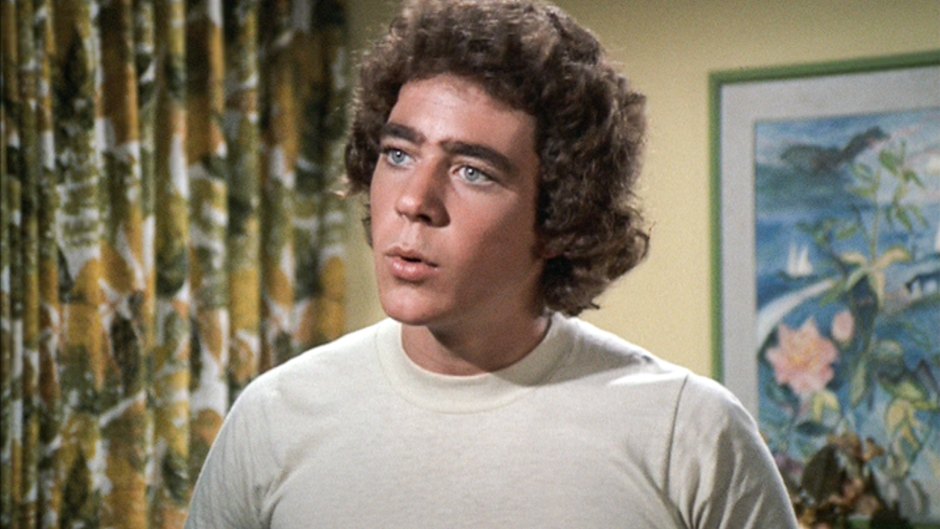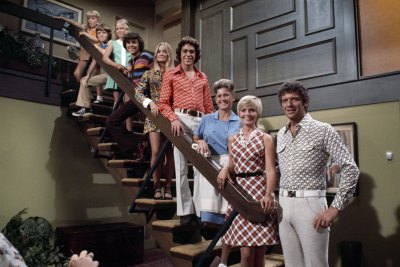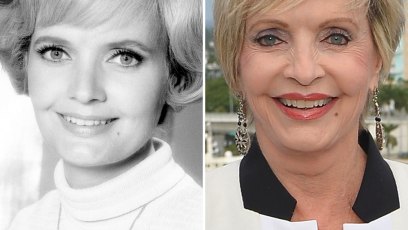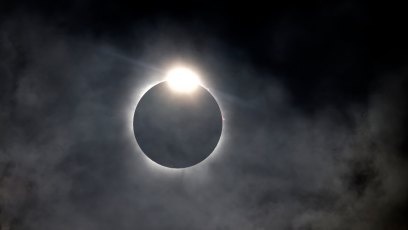
Getty Images
Barry Williams Celebrates Life on ‘The Brady Bunch’ and Beyond (EXCLUSIVE)
A key element of The Brady Bunch was the little life lessons and morals that the show would offer up in pretty much every episode. Whether you viewed them as corny or enlightening, they made an impact. And it was certainly one of the big appeals to not only the audience, but the young cast who brought the bunch to life. For actor Barry Williams, who played oldest boy Greg, it was the way the show ended for real (rather than reel) that, ironically, served as perhaps the greatest lesson of all.
The Brady Bunch, which brought together a lovely lady with three very lovely girls and a man with three boys of his own, made its debut in 1969 and ran for five seasons, concluding in 1974. At the end of that fifth season, there was every expectation the cast and crew would be back for a sixth. But just three weeks before production was scheduled to commence, they were notified that the series had been canceled. Just like that, it was over. And for Barry, it was a major wake-up call.

(Photo Credit: Getty Images)
A Hard Life Lesson
“I think people had different reactions to it ending,” he exclusively relates to us from his home in Branson, Missouri. “I thought Greg was going to go to college. I was looking forward to getting out of the house and maybe moving into my own show and things like that, because I had those kinds of ambitions. And we had been promised that it would go another year. And then they pulled the plug. There’s a story I tell that goes to answering the question about why kids sometimes have a tough time when a show ends and they have to adjust back into what you could call the ‘real’ world or society. Or just simply getting along with their friends.
“When you’re working on a television show, especially a network television show, it’s very privileged,” Barry continues. “There are a lot of people around that are there to help you to make sure if you need a cup of coffee, or there’s someone you could ask for a cup of coffee. People look after your clothes, your hair; they help you with your lines and, in our case, with school. It goes on and on and on. That’s all part of being a network show. So I got a call on Friday late afternoon, 5:00 or 6:00. ‘Barry, the show’s been canceled.’ Okay, so on Monday I get up and drive to the studio to clean out my dressing room and the guard at the gate to Paramount Studios, whom I have been saying, ‘Hi, Fritz’ to for the last five years, virtually every morning, says, ‘Oh, hello, Mr. Williams. What’s up?’ ‘I’m going to clear out my dressing room.’ And he asked me if I had a pass to get on to the studio lot. I asked, ‘Is one necessary?’ And he said, ‘Well, yes.’ So I had to pull over while he was able to get me a pass for guest parking. I went in and I drove to my parking space. You know, that’s where I parked, where my name was. And what I found was that my name had been painted over and replaced.”

(Photo Credit: Getty Images)
He lets this sink in for a moment, not that it takes long to realize that he was notified about the cancelation late on Friday and by Monday he had been pretty much erased, if you will.
“I was gone; I was out, and that was a major wake up call,” he explains. “A wake-up call to the business and what to expect. Here today, gone tomorrow. Done. It’s been nice, that’s been fun. The machine marches on, not just in show business, of course, but for someone who didn’t see that coming… And many children, kids, don’t, especially when they’re protected for so many years. Then it’s quite a shock.”
It would seem so jarring an experience, that one could easily become bitter, and it’s curious that Barry isn’t. Though he’s quick to point out, “I can’t say that all of us didn’t get bitter over it. The meat market in Hollywood is always about new. It’s always about fresh. It’s always about different. I’d been on a show for five years. The producers, casting director, studios, networks tend to put you on hold for a bit, like a few years, to kind of let everything cool off before you’ll start working again. That’s when you either grow up, or you get bitter and stay there.”

(Photo Credit: Getty Images)
Born Barry William Blenkhorn on September 30, 1954, in Santa Monica, California, Barry developed a desire for acting when he was a kid, and managed to score his first guest-starring role in an episode of Dragnet 1967. From there he made appearances on shows like Adam-12, The Invaders, That Girl, Mission: Impossible, The Mod Squad, and Here Comes the Brides. All of that ultimately led to those fives years on The Brady Bunch, a bit of pop culture immortality, and a moment of decision for him.
“I decided to go outside television,” he explains. “I started a whole new career in musical theater and flourished. So that’s worked out fine with me and I’ve been able to integrate television back into it. Now I’ve been active in nearly every aspect of show business — certainly all the aspects I’m interested in — with some degree of success. Which would be television and musical theater, including Broadway and national tours. I’ve performed in Las Vegas, I’ve recorded CDs, I’ve written a bestselling book, I’ve produced that book into a television movie for NBC, I’ve been a radio DJ on Sirius, I’ve been a writer on different TV shows, I’ve had my own TV show, A Very Barry Branson, that was about my adventures as a big fish/small pond kind of thing here in Branson, and that was a musical variety rock and roll show called ‘70s Music Celebration. So I’m pleased. Things have worked out just fine.”
Surviving ‘Child Star Syndrome’
Which is not something that young cast members from a TV show — especially back then — can say, many of them coming out of success and spiraling into despair that their entire world has changed. Although Maureen McCormick (who played Marcia Brady) had her share of well-documented issues, the Brady Bunch kids seemed to have come out of it relatively okay.

(Photo Credit: Getty Images)
“There are a couple of things that differentiated us from many of the other sort of, what you’d call, child stars of the day,” Barry reflects. “Chief among them is there were six of us as opposed to one or two in the show. And that creates a whole different dynamic, because it’s not just the kid trying to figure it out. There’s six of us trying to figure out what’s going on, and what all this attention is about, and the workload, the responsibilities, the people coming up to us, adjustments in school, adjustments in public, being recognized, traveling — all of that kind of thing. And so we could lean on one another. I don’t know if Mr. Schwartz [series creator Sherwood Schwartz] knew this at the time, but every one of our cast members, the kids, came from nuclear families. There were no divorces prior to or during the time of filming The Brady Bunch, which means that we all had these families, real families, that we went back to and were stabilizing forces in our world. I think that contributed heavily to our ability to mature and grow up in public, and ultimately adjust to being adults.”
One bit of a saving grace for him as well was the fact that he viewed The Brady Bunch, even as it was happening, from a different vantage point than a lot of other people. “I didn’t come from it as a fan of the show, and I didn’t come at it as a viewer,” he points out. “I come from it as a creator and talent as an actor. I was all about the anatomy of it. How did this work? How did these different departments interact and interface to make things happen? I was fascinated with lights, with direction, production, writing, staging. All of that stuff. Now, those things go on in any production, but I was most impressionable being 14, 15, 16, 17, 18, 19, and, then, when it went off the air, I was 20. That’s what I think about. How cool it was to grow up in that world.”
Those Brady Reunions
You know, there’s a famous bit (probably the only famous bit) in 1990’s The Godfather Part III where Al Pacino, reprising the role of mobster Michael Corleone, comments, “Every time I think I’m out, they pull me back in!” For many years, the same could be said about Barry and his Brady co-stars. Somehow, for many years the fans and Hollywood could never let the concept of the show go. In 1972, for instance, while the live action show was still in production, he, Maureen, Eve Plumb, Christopher Knight, Mike Lookinland and Susan Olsen voiced their characters in the animated The Brady Kids.

(Photo Credit: Getty Images)
“That was goofy,” Barry sighs. “Looked a lot like The Archies, didn’t it? Do you know why? It was the same company, it was the same wardrobe, and the same figures with our heads stuck on them.”
Then there was the 1976-77 The Brady Bunch Hour, a kind of out-there concept that had the Bradys being hired to host their own variety show — basically a show within a show. “Loved our guest stars,” says Barry. They included people like Tina Turner, Rich Little, Milton Berle, Tony Randall from The Odd Couple, Lee Majors from The Six Million Dollar Man, actor Vincent Price, Charo, The Hudson Brothers, and Paul Williams.
Notes Barry, “I came off of Broadway to do the show. I was doing Pippin in New York when that call came. I thought, ‘Well, I can do this show in New York for 600 people a night, or I can do this variety show on television for 35 million people a week.’ So I did that.”
Although he appeared in the 1981 TV movie The Brady Girls Get Married (a double wedding for Marcia and Jan), he did not show up in the spin-off series The Brady Brides. “I wasn’t involved in the series, so hence that would be my least favorite of all the reunions,” he smiles.
And then there was the 1988 TV movie A Very Brady Christmas followed by 1990’s The Bradys, both of which decided to take a more dramatic approach to the material and earned the nickname of “Bradysomething” from critics.

(Photo Credit: Getty Images)
“It was…anachronistic,” Barry suggests. “When you think of the Bradys, you don’t want the drama, you just want the fun and the silly. I think that was misguided. In one episode, Maureen went from being lovely Marcia to alcoholic Marcia to a recovered Marcia. In one episode. Overkill feels like the right word.”
Embracing the Future
All of that, though, as noted, Barry has used to propel himself into different areas. Several years ago he made the move from California to Branson, Missouri, initially attracted to its strong, centralized entertainment community, which has included neighbors like Tony Orlando (“A friend since the Brady days”), the late Glen Campbell, and Wayne Newton, among others.
“I also thought, ‘Wow, this would be a great place where I might be able to do the show I’ve always wanted to do; a musical variety show. Live band, big cast, play a guitar, tell stories about my career.’ So I came and fell in love with the place. I fell in love with the energy, with the mountains, with the people. It’s much more relaxed. I live on a great big lake with 1,100 miles of shoreline. It’s a very good and more relaxed style, high quality of life. So even though I’m not doing my show anymore — I did it for six years — I still make my home here and expect I will for good.”

(Photo Credit: Getty Images)
And it’s certainly not like he’s slowing down at all. The 63-year-old is currently arranging a Classic TV Cruise to the Caribbean, which would bring together him and a variety of other performers from beloved television shows. “It would be an opportunity for people that I’ve known and worked with, along with 800 or a thousand of their loyal fans. We can do panels. Maybe have Dawn Wells (from Gilligan’s Island) do a treasure hunt for Greg Brady’s tiki onshore for prizes. I’m thinking of doing karaoke with Anson Williams and Donny Most (from Happy Days). We’ll run TV episodes all over the ship and that kind of thing.” The cruise is being targeted for Spring 2019.
Additionally, he’s the spokesman for Wagyu Beef (“It’s what you want beef to be,” he says, not realizing that would be the perfect advertising tag for the healthier beef brand); and he’s looking at a Christmas show that will primarily tour the East Coast this November to December called Toy Shoppe, taking over from Kenny Rogers who personally asked him to assume the lead. “This is a sentimental Christmas story, about the values and meaning of the season. All of the songs are written by Kenny and his musicians.”

(Photo Credit: Getty Images)
And as if that isn’t enough, he’s also the spokesperson for the Me TV network, which specializes in nostalgia television and on which The Brady Bunch has a significant place in the schedule. In this role, Barry has traveled around the country on their behalf, promoting Classic TV and having some fun in vignettes that have him interacting with footage from Gilligan’s Island, The Beverly Hillbillies, Leave It to Beaver, and, of course, The Brady Bunch. As such, it’s allowed him to think about why the Bradys appeal the way they do today, particularly considering that we’re living in far more cynical times than when the show originally aired.
“One of the more fascinating things about The Brady Bunch is that it’s a show that cuts across every demographic there is,” he says. “First, it’s multi-generational. During the six years I performed my show in Branson, it was a pretty good cross section of Middle American. I would see grandpas to grandchildren, and parents in between. All ethnic bases and, of course, religions. So The Brady Bunch has enjoyed, from my experience, a universal kind of appeal.”
What he feels has become so deeply ingrained with people about the show is the chemistry between the cast members. “As people and actors, we like each other,” he states. “We cared about each other, we protected each other. And we took on those roles in life. I, as a big brother, would be protective, etc. There was middle girl syndrome, but we had a chemistry. Now chemistry is something you can’t fake. You can’t write it, you can’t pretend it, you can’t act it. It’s there or it’s not there. As I look at episodes, I can see it. And I think that, perhaps above all the other qualities of the show, is the most responsible for its sustained popularity. And then, of course, as a show we weren’t really taking stands. Aside from the clothes, we weren’t really tied to any particular time frame. It was morals, it was communication, it was supporting one another, it was the family dynamic, it was the stories that almost all kids grow up experiencing. All of those things that are timeless, before us and ever since, and that was the focus of each episode.”

(Photo Credit: Getty Images)
All in all, Barry Williams looks back at his life and career with a sense of wonder and genuine gratitude.
“All of it is absolutely mind-blowing,” he says, “but I just don’t stay stuck in that, because there are things to do with it and to appreciate and to enjoy and be grateful for. I’m all of those things, and I try and repurpose that kind of familiarity. For instance, this last year I went down to North Carolina to sing the National Anthem for NASCAR. It was the kick-off of the season. So there, again, there are 80,000 people there and networks and all the drivers and stuff, and I was invited to do the anthem. Those are the kind of honors that might come the way of Greg Brady or myself, and that I’m able to enjoy as a result of the platform of the show. It really is a phenomena of sorts and I experience it all the time when I travel. I’ve had bus drivers in New York City on Madison Avenue stop in the middle of the street just to have himself and the passengers wave at me. Can you believe it?”
Something in his voice says that he can’t either.






































